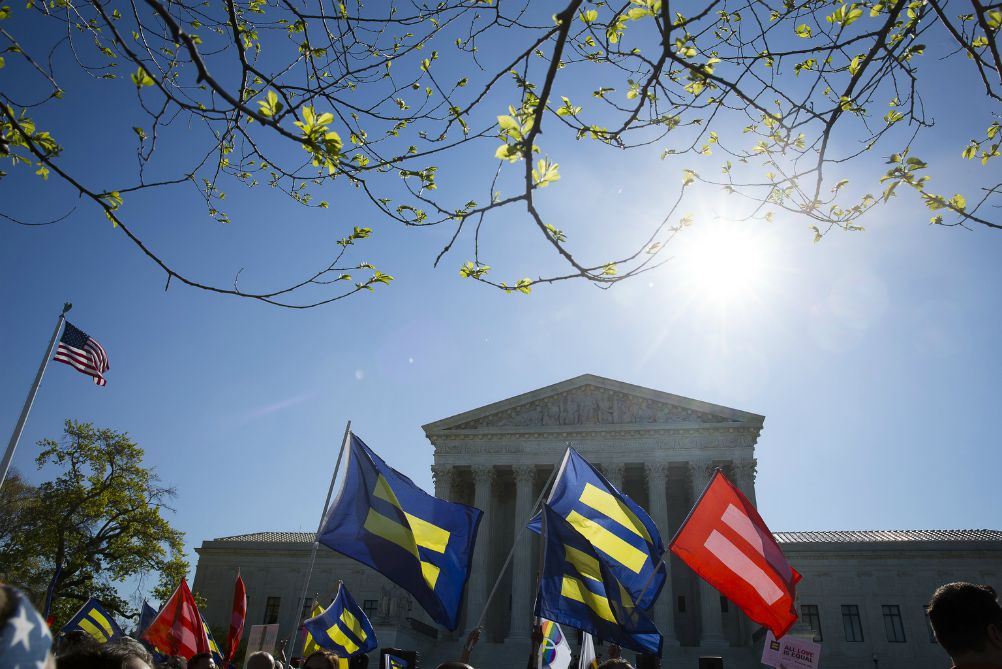
Supporters for marriage equality stand outside the U.S. Supreme Court in Washington April 28, 2015, a few months before it ruled same-sex marriage to be legal in all states. (CNS/Tyler Orsburn)
I recently came across a term I had never seen before: systemic sin. It was in a thread by Union Theological Seminary, in response to an article in The Washington Post about how evangelical Christians at a Southern Baptist church in Luverne, Alabama have come to justify Trump as a sinner sent by God to save America and protect Christians from annihilation. On Twitter, Union argued:
Though much-analyzed, it's not discussed enough how parishioners' reservations about @realDonaldTrump hinge around personal behavior (adultery, affairs, language, etc.), not systemic sin. …
3. Now, this is all deeply sinful behavior and the members of Luverne's First Baptist Church are right to feel it contradicts Christ's message. However, decades of theology framing sin as an interpersonal affair leaves them blind to this presidency's other sins.
Union highlighted a few well-known systemic sins: imprisoning migrants and taking their children away, granting tax cuts for the richest among us while cutting programs meant to help those in poverty, eliminating or reducing healthcare benefits for large swaths of people. These are examples of sinful policy that contradicts both Old Testament prophets and Christ's teaching.
I agree with Union's assessment. In fact, I wish I'd thought of every one of these numbered tweets first and written them up for this week's column. But I also think Trump supporters at Luverne's First Baptist Church ignore the sins Union pointed out because they see personal immorality as a systemic sin that has spread from coast to coast and now threatens their existence.
Though state-level restrictions make it increasingly difficult to obtain an abortion, national law permits abortions. I suspect that at a church that keeps "stacks of pamphlets about abstaining from premarital sex," the legality of abortion remains the nation's greatest sin — if that position hasn't been taken by legality of same-sex marriage.
In article after article and poll after poll, evangelicals like those in Luverne have said they feel they can't live out their beliefs or speak up against sin with laws in place to protect certain groups. They don't see that these groups have historically been feared, marginalized, ostracized, or violently discriminated against. They see themselves, their beliefs, and their way of life as under attack.
Their perception, however, is due to, as Union said, an emphasis on "individual piety that masquerades as Christianity." And when I think about how often Jesus called the Pharisees hypocrites for their devotion to Mosaic law as they ignored people hurting all around them, I know the individual piety type of religious teaching isn't new.
Advertisement
I remember when my focus was on whether or not my behavior and thoughts (and everyone else's behavior and thoughts) pleased God. It was an unhappy life. But it didn't prevent me from weighing whether a professed Christian leader's social policy aligned with Christ's teachings. This was around the time for me to vote in my first presidential election, George W. Bush versus Al Gore — the time in my life when, while I didn't believe homosexuality was a choice, I didn't think gay people should have the right to marry. I chose who I would vote for the night of the presidential debate held on campus. Bush articulated his education policy, and a friend sitting next to me and I booed the auditorium screen. We cheered what Gore had to say about the environment. We believed God had appointed humans stewards over the earth; we were to take care of God's creation. We believed quality education was a moral right, especially for the black children we weren't convinced Bush cared about. So I know it can be difficult to make a belief in individual piety align with a belief in social justice, but it is possible.
My belief system, thankfully, has changed from that unhappy time. Some might say my morals have fallen because I considered the U.S. Supreme Court's decision to legalize same-sex marriage a win for the country, because I question what premarital sex has to do with holiness, or because my theology isn't rooted in guilt and shame and the fear of hell. But I remain focused on how we treat one another — interpersonally and systemically. I believe systemic and interpersonal sin reflect one another. Someone who grabs women's crotches is also likely to be someone who doesn't believe women know their own minds about their bodies and healthcare, or who wants them to be silent about unfair wages. Someone who dehumanizes or ridicules entire nations or nationalities is someone who will drive policies making those peoples' lives miserable and legalizing their abuse. Someone who will pay off a porn star he had an affair with will pay off farmers after disrupting their livelihoods with bad trade policies. Power only magnifies such malice.
Also these days, I think a lot about Jesus' declaration that he came so that we might have life and have it more abundantly. And I wonder, how could abundance exist without freedom and justice?
[Mariam Williams is a Kentucky writer living in Philadelphia. She holds a Master of Fine Arts degree in creative writing and certificate in public history from Rutgers University-Camden. She is a contributor to the anthology Faithfully Feminist and blogs at MariamWilliams.com. Follow her on Twitter @missmariamw.]
Editor's note: Don't miss Mariam Williams' column, At the Intersection. We can send you an email every time a new one is posted. Click on this page and sign up.








